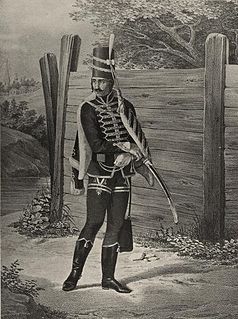Enlisted ranks
Enlisted troops
| Rank insignia [1] | Name [1] | Description | |||||
|---|---|---|---|---|---|---|---|
| Epaulette | Camouflage | German | French | Italian | Romansh [ citation needed ] | English designation | |
| Rekrut (Rekr) | Recrue (recr) | Recluta | Recruit | Recruit | |||
 |  | Soldat (Sdt) | Soldat (Sdt) | Soldato | Schuldà | Private E-1 | |
 |  | Gefreiter (Gfr) | Appointé (App) | Appuntato | Appuntà | Private E-2 | E-1 Privates can be promoted to E-2 after a minimum of 20 days' service in a refresher course, subject to good performance. [2] E-2 Privates also receive 6 CHF daily pay (as opposed to 5 CHF prior to promotion) [3] |
 |  | Obergefreiter (Obgfr) | Appointé-chef (App chef) | Appuntato capo | Primappuntà | Private first class | The rank "Obergefreiter" was removed as of 1 January 2019 with the WEA of the Swiss Army. [4] [ full citation needed ] However those soldiers previously awarded this rank are able to keep it. |
Non-commissioned officers (NCO)
| Rank insignia [1] | Name [1] | Description | |||||
|---|---|---|---|---|---|---|---|
| Epaulette | Camouflage | German | French | Italian | Romansh [ citation needed ] | English designation | |
 |  | Korporal (Kpl) | Caporal (Cpl) | Caporale (Cpl) | Caporal (Cpl) | Corporal | Soldiers in this rank serve as specialist NCOs (e.g. arms specialization, CBRN specialization, postal soldiers) |
 |  | Wachtmeister (Wm) | Sergent (Sgt) | Sergente (Sgt) | Sergent (Sgt) | Sergeant | Currently, the standard junior NCO rank |
 |  | Oberwachtmeister (Obwm) | Sergent chef (Sgt chef) | Sergente capo (Sgt capo) | Caposergent (Csgt) | Sergeant first class | This rank is awarded to Sergeants who receive very good performance assessments. Holders of this rank are appointed to be the platoon leader's replacement and serve an additional 10 days compared to the standard Sergeant rank. [2] |
Higher NCOs
| Rank insignia [5] | Name [5] | Description | |||||
|---|---|---|---|---|---|---|---|
| Epaulette | Camouflage | German | French | Italian | Romansh [ citation needed ] | English designation | |
 |  | Feldweibel (Fw) | Sergent-major (Sgtm) | Sergente maggiore (Sgtm) | Primsergent (Psgt) | Sergeant major | Lowest rank of "Higher non-commissioned officers" (NCO); it used to be a higher rank than Feldweibel and to oversee unit-level military service and operations. Since the 2003 reform a specialist rank only. Nowadays, Feldweibel are mainly seen in military police, NBC and other specialist units. |
 |  | Fourier (Four) | Fourrier (Four) | Furiere (Fur) | Furier (Fur) | Quartermaster sergeant | The higher NCO who administers a company's finances, subsistence and lodging. |
 |  | Hauptfeldweibel (Hptfw) | Sergent-major chef (Sgtm chef) | Sergente maggiore capo (sgtm capo) | Capoprimsergent (cpsgt) | Chief sergeant major | The Hauptfeldweibel oversees unit-level military service and operations. |
 |  | Adjutant Unteroffizier (Adj Uof) | Adjudant sous-officier (Adj Sof) | Aiutante sottufficiale (aiut suff) | Adjutant sutuffizier (Adj suff) | Warrant officer | |
 |  | Stabsadjutant (Stabsadj) | Adjudant d'état-major (Adj EM) | Aiutante di stato maggiore (aiut SM) | Adjutant da stab (Adj S) | Staff warrant officer | |
 |  | Hauptadjutant (Hptadj) | Adjudant-major (Adjm) | Aiutante maggiore (Aiut magg) | Adjutant principal (Adj prin) | Master warrant officer | |
 |  | Chefadjutant (Chefadj) | Adjudant-chef (Adj chef) | Aiutante capo (Aiut capo) | Chefadjutant (Schefadj) | Chief warrant officer | |






























